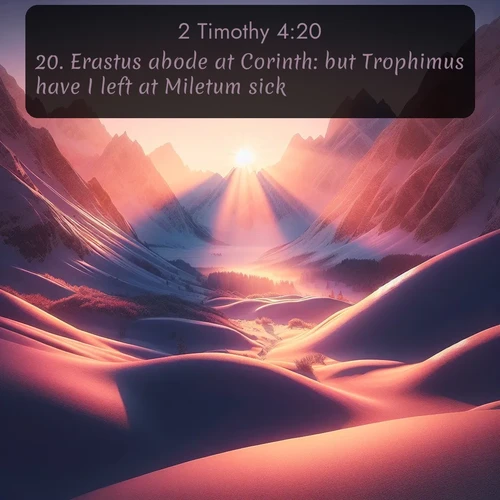2 Timothy 4:20 plusieurs versions / traductions
English Bible Translations
20. Erastus was stopping at Corinth; but Trophimus, when I last saw him was at Miletus, ill.
20. Erastus remained in Corinth, but Trophimus I left behind in Miletus sick.
German Bible Translations
20. Erastus blieb in Korinth, Trophimus ließ ich in Milet krank zurück.
French Bible Translations
20. Éraste est demeuré à Corinthe, et j'ai laissé Trophime malade à Milet.
20. Éraste est demeuré à Corinthe, et j'ai laissé Trophime malade à Milet.
Versions with Strong Codes
2 Timothy 4 / KJV_Strong20. Erastus[G2037] abode[G3306] at[G1722] Corinth:[G2882] but[G1161] Trophimus[G5161] have I left[G620] at[G1722] Miletum[G3399] sick.[G770]
Strong Code definitions
G2037 Erastos/er'-as-tos from erao (to love); beloved; Erastus, a Christian:--Erastus.
G3306 meno/men'-o a primary verb; to stay (in a given place, state, relation or expectancy):--abide, continue, dwell, endure, be present, remain, stand, tarry (for), X thine own.
G1722 en/en a primary preposition denoting (fixed) position (in place, time or state), and (by implication) instrumentality (medially or constructively), i.e. a relation of rest (intermediate between 1519 and 1537); "in," at, (up-)on, by, etc.:-about, after, against, + almost, X altogether, among, X as, at, before, between, (here-)by (+ all means), for (... sake of), + give self wholly to, (here-)in(-to, -wardly), X mightily, (because) of, (up-)on, (open-)ly, X outwardly, one, X quickly, X shortly, (speedi-)ly, X that, X there(-in, -on), through(-out), (un-)to(-ward), under, when, where(with), while, with(-in). Often used in compounds, with substantially the same import; rarely with verbs of motion, and then not to indicate direction, except (elliptically) by a separate (and different) preposition. see G1519 see G1537
G2882 Korinthos/kor'-in-thos of uncertain derivation; Corinthus, a city of Greece:--Corinth.
G1161 de/deh a primary particle (adversative or continuative); but, and, etc.:--also, and, but, moreover, now (often unexpressed in English).
G5161 Trophimos/trof'-ee-mos from G5160; nutritive; Trophimus, a Christian:--Trophimus. see G5160
G620 apoleipo/ap-ol-ipe'-o from G575 and 3007; to leave behind (passively, remain); by implication, to forsake:--leave, remain. see G575 see G3007
G1722 en/en a primary preposition denoting (fixed) position (in place, time or state), and (by implication) instrumentality (medially or constructively), i.e. a relation of rest (intermediate between 1519 and 1537); "in," at, (up-)on, by, etc.:-about, after, against, + almost, X altogether, among, X as, at, before, between, (here-)by (+ all means), for (... sake of), + give self wholly to, (here-)in(-to, -wardly), X mightily, (because) of, (up-)on, (open-)ly, X outwardly, one, X quickly, X shortly, (speedi-)ly, X that, X there(-in, -on), through(-out), (un-)to(-ward), under, when, where(with), while, with(-in). Often used in compounds, with substantially the same import; rarely with verbs of motion, and then not to indicate direction, except (elliptically) by a separate (and different) preposition. see G1519 see G1537
G3399 Miletos/mil'-ay-tos of uncertain origin; Miletus, a city of Asia Minor:--Miletus.
G770 astheneo/as-then-eh'-o from G772; to be feeble (in any sense):--be diseased, impotent folk (man), (be) sick, (be, be made) weak. see G772
Prédications qui analysent les thèmes 2 Timothée 4
Thèmes : Prêcher la parole; Châtiment et récompenseRelated Sermons discussing 2 Timothy 4
Themes : Prêcher la parole; Châtiment et récompensesee also: Bible Key Verses ; KJV Bible Images, BBE Bible images

